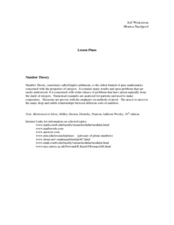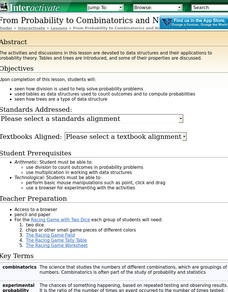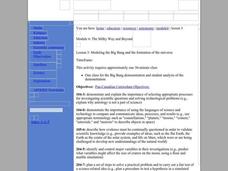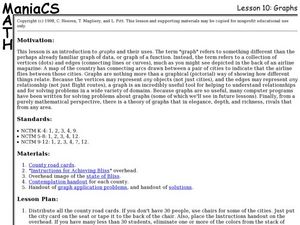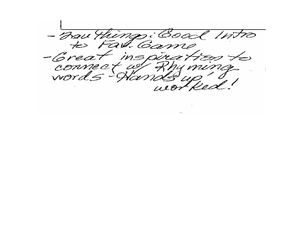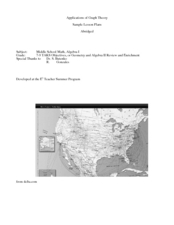Curated OER
Number Theory
Learners explore the concept of number theory. They discuss an assortment of number theory topics such as prime numbers, composite numbers, GCF, modular arithmetic, and others in a lecture style discussion. Pupils view videos about these...
Diablo Valley College
The Language of Sets and Set Notation
The basics of number theory and set notation are explained in a highly approachable way in a self-contained instructional activity and worksheet. Introducing the vocabulary and concepts from ground zero and building to more complex...
Beacon Learning Center
Ten Pins
Multiplying with multiples of 10, 100, and 1,000 provides an opportunity to discuss patterns that arise with zeros. The class uses these patterns to solve problems. Then they rotate through three work stations, including a computer-based...
Curated OER
da Vinci: Body Proportion Theories
Middle schoolers investigate the validity of da Vinci's proportion theory by recording human measurements on scatter plots. In groups of three, they record each other's height and wingspan to create a Powerpoint presentation, chart, or...
Curated OER
Number Theory - Week 12
In this number theory worksheet, students study integers and their properties. They explore the Fibonacci Sequence and approximate irrational numbers. This two-page worksheet contains eight problems.
Scholastic
Optical Illusion
Number theory gets a workout in an activity that asks individuals to identify and color code the prime numbers and the composite numbers in the provided graphic.
Curated OER
Divisibility Rules Using Scientific Calculators
Young learners apply divisibility rules to determine if a number is a factor of another number. They discuss what numbers are factors of another number and identify patterns using divisibility rules.
Shodor Education Foundation
From Probability to Combinatorics and Number Theory
What middle schooler does not enjoy an occasional online game? In this lesson play, you will find embedded links to an online probability game, and informative pages about how division is used in probability, the concept of tree models,...
Curated OER
Two-Step Problems and Money Concepts
Elementary schoolers solve two-step equations and practice money concepts. They solve multi-step addition and subtraction contextual problems and apply money concepts to real life situations. Pupils use pictures and counters to help them...
Curated OER
The Big Bang Theory
Students will use scientific reasoning to formulate ideas about the formation of the universe using the Big Bang Theory. The use of critical thinking skills is part of the activity and the foundation of the scientific method will serve...
Curated OER
Factor Game (Number Theory)
Learners use a Factor Board game to identify the properties of prime, composite, abundant, deficient and perfect numbers. The game is comprised of the numbers from 1 to 30 placed in a 5 by 6 grid. Pupils figure out they can score more...
Curated OER
CONCEPTS IN NUMBER THEORY.
Students study the Maya culture and their achievements in mathematics, how bacteria grow exponentially, use rational numbers to convert back and forth between Celsius and degrees Fahrenheit, how some architectural designs are examples of...
Curated OER
Euclidean Algorithm
Learners are introduced to the concept of a Greatest Common Divisor. They review the number systems. Students are told how the entire field of Number Theory primarily uses the integers. They are told the Fundamental Theorem of Algebra.
Curated OER
One Size Fits All, Part 1
Can you tell how tall someone is just by looking at their feet? In this activity, young mathematicians measure their height, arm span, and foot size, graph their findings, and answer questions about how these measurements are related....
Curated OER
Pythagoras' Theorem
Students are introduced to the Pythagoras' Theorem and its history, proofs and practice in application. Students find perimeters, areas and volume of everyday objects. Students state and explain the theory.
Curated OER
Scale Model of the Solar System
Young scientists gain a better understanding of space, the solar system and its vastness by creating a scale model. Students first need to calculate the distance between each of the nine planets according to the size of their scale. This...
Curated OER
Lesson 10: Graphs
Students explore graph theory. In this geometry lesson, graphs are used to solve problems in a variety of domains. In this lesson the term graph refers to a collection of vertices and edges used to depict...
Curated OER
Classroom Builder
Students explore music theory by discussing a classic song. In this musical notation lesson, students listen to the song "My Favorite Things" and discuss and share their personal tastes with the class. Students practice writing notes on...
Curated OER
The Big Bang Theory
Learners explore the Big Bang Theory and discover how it can be used to explain the origin of the universe. For this Big Bang Theory lesson, students use a balloon with colored paper inside, blow it up and pop it, group the colored...
Curated OER
Proving (a Theorem) and Disproving (a Theory)
As a cross-curricular lesson, your class examines the issues of gender discrimination, careers, and gender roles. They read and discuss an article, prepare a proof of the Pythagorean theorem as a class, and develop a creative...
Institute of Electrical and Electronics Engineers
Coloring Discrete Structures
What's the least number of colors needed to color a U.S. map? The instructional activity begins by having pupils view a video clip on continuous and discrete phenomenon, then launches into an activity reminiscent of Zeno's paradox....
American Statistical Association
Chunk it!
Chunking information helps you remember that information longer. A hands-on activity tests this theory by having learners collect and analyze their own data. Following their conclusions, they conduct randomization simulations to...
Curated OER
Application of Graph Theory
Students investigate different online tutorials as they study graphing. In this graphing lesson, students apply the concept of graphs cross curricular and use it to make predictions. They define the purpose and theories behind graphs.
Curated OER
Got These Properties? (Commutative in Addition/Zero in Addition and Subtraction)
Second graders examine the commutative property of addition and the property of zero in addition and subtraction. They complete an asessment worksheet to gain practice reading and working number sentences horizontally and vertically.
Other popular searches
- Math Number Theory
- Number Theory and Operations
- Number Theory 1
- Number Theory Rounding
- Number Theory Ed Helper
- Number Theory Ii
- Number Theory Edhelper
- Number Theory Concepts
- Number Theory Lesson Plans
- Math + Number Theory
- Egypt Math Number Theory
- Color Tiles Number Theory
